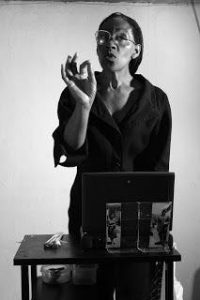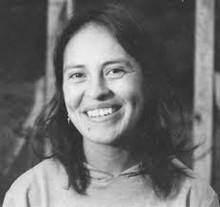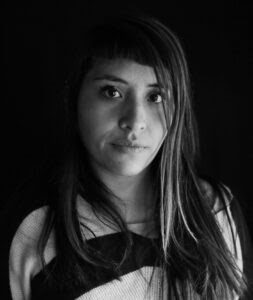Argentina
Teatro en Sepia (TES)
 The Teatro en Sepia theatre company is directed by Alejandra Egido and made up of Afro-descendant women, including Afro-migrant and Afro-Argentine women. It was formed in 2010 during the making of an iconic play Calunga Andumba written by two Afro-Argentine playwrights in the 1970s. After this, the company dedicated itself to writing, producing and staging works of their own authorship in which the experience of Afro-descendants in Argentina is narrated and given space. The space created by TES was entirely non-existent in a country whose extensive theatrical production sector mostly represents the experiences of the middle-class sectors and of a “white and European Argentina”.
The Teatro en Sepia theatre company is directed by Alejandra Egido and made up of Afro-descendant women, including Afro-migrant and Afro-Argentine women. It was formed in 2010 during the making of an iconic play Calunga Andumba written by two Afro-Argentine playwrights in the 1970s. After this, the company dedicated itself to writing, producing and staging works of their own authorship in which the experience of Afro-descendants in Argentina is narrated and given space. The space created by TES was entirely non-existent in a country whose extensive theatrical production sector mostly represents the experiences of the middle-class sectors and of a “white and European Argentina”.
CARLA is accompanying a process of documentation and reflection on the trajectory of Theater in Sepia in dialogue with Teatro el Katango. The directors of Teatro en Sepia and Teatro el Katango discuss their trajectories and together build non-hegemonic forms of theatre. The staging presents stories and ways of life under attack by the project of the nation, and which are based on the regeneration and reconstruction of Afro and Mapuche lives. The specific lines of inquiry have been: decolonization of racialized and sexualized bodies; territorial expulsion, mobility and diaspora; nation and intersectionality; art and politics; archives and methodologies.
As a result of this collaboration, Miriam Álvarez and Alejandra Egido are immersed in a dramaturgy workshop where both are writing in relation to the other’s work. The final form of this ongoing writing is not yet known.
For more information about this artist, see https://afrofeminas.com/2014/10/29/teatro-en-sepia/
https://www.youtube.com/watch?v=-zkPPyBvo_o
Mapuche Theater Group el Katango
 The Mapuche theatre project is the result of Miriam Álvarez’s dramaturgical and research work over more than a decade, based in the province of Rio Negro. The documentary theatre project that she currently coordinates arises from her advising of theatre students who carried out collaborative work with older adults focused on their memories of travel to and from the city. In the workshops, the production of the dramatic text and the staging, the expulsion of Mapuche families from rural areas and the shaping of life in the popular neighbourhoods of the city of Bariloche are narrated. This work is part of a historical-anthropological research project based at the University of Rio Negro that studies the impact of the Mapuche genocide. In previous periods, the dramaturgy, direction and acting work of Miriam Álvarez was focused on the reconstruction of Mapuche corporality, gestures and identities. This work was materialized, for example, in the staging of the play Pewma, focused on the role of dreams as a vehicle of memory.
The Mapuche theatre project is the result of Miriam Álvarez’s dramaturgical and research work over more than a decade, based in the province of Rio Negro. The documentary theatre project that she currently coordinates arises from her advising of theatre students who carried out collaborative work with older adults focused on their memories of travel to and from the city. In the workshops, the production of the dramatic text and the staging, the expulsion of Mapuche families from rural areas and the shaping of life in the popular neighbourhoods of the city of Bariloche are narrated. This work is part of a historical-anthropological research project based at the University of Rio Negro that studies the impact of the Mapuche genocide. In previous periods, the dramaturgy, direction and acting work of Miriam Álvarez was focused on the reconstruction of Mapuche corporality, gestures and identities. This work was materialized, for example, in the staging of the play Pewma, focused on the role of dreams as a vehicle of memory.
CARLA is collaborating with the research being carried out by Miriam Alvarez, together with researchers from the University of Rio Negro, on Mapuche mobilities and genocide. Specifically, we are collaborating with students of the theatre career analyzing their own documentary theatre work.
CARLA is also accompanying a process of documentation and reflection on the trajectory of Theater in Sepia in dialogue with Teatro el Katango. The directors of Teatro en Sepia and Teatro el Katango discuss their trajectories and together build non-hegemonic forms of theatre. The staging presents stories and ways of life under attack by the project of the nation, and which are based on the regeneration and reconstruction of Afro and Mapuche lives. The specific lines of inquiry have been: decolonization of racialized and sexualized bodies; territorial expulsion, mobility and diaspora; nation and intersectionality; art and politics; archives and methodologies.
As a result of this collaboration, Miriam Álvarez and Alejandra Egido are immersed in a dramaturgy workshop where both are writing in relation to the other’s work. The final form of this ongoing writing is not yet known.
For more information about this artist, see https://www.youtube.com/watch?v=WDj-F_BGv78
http://hidvl.nyu.edu/video/000549297.html
Identidad Marrón
 Identidad Marrón is an organization dedicated to visibilizing and challenging the approach of public policies regarding structural racism in Argentina. The group was born with the aim of making visible the racism affecting people of Indigenous descent – marrón (brown) people – from an intersectional perspective and articulating its interpersonal, institutional and cultural dimensions, with aspirations to effect real changes at the level of social structures, public policies and the full exercise of rights. From an anti-racist perspective, the group seeks to create meanings about Brown identity, with an agenda that crosses various fields such as cultural management, law, communication, the arts, cinema, and social and political sciences.
Identidad Marrón is an organization dedicated to visibilizing and challenging the approach of public policies regarding structural racism in Argentina. The group was born with the aim of making visible the racism affecting people of Indigenous descent – marrón (brown) people – from an intersectional perspective and articulating its interpersonal, institutional and cultural dimensions, with aspirations to effect real changes at the level of social structures, public policies and the full exercise of rights. From an anti-racist perspective, the group seeks to create meanings about Brown identity, with an agenda that crosses various fields such as cultural management, law, communication, the arts, cinema, and social and political sciences.
 Identidad Marrón is currently writing a booklet on art, Brown concepts and anti-racism with the editorial support of CARLA (Ana and Pablo). CARLA is also conducting an audience study on the exhibition curated by Identidad Marrón, “What do museums need to learn?”.
Identidad Marrón is currently writing a booklet on art, Brown concepts and anti-racism with the editorial support of CARLA (Ana and Pablo). CARLA is also conducting an audience study on the exhibition curated by Identidad Marrón, “What do museums need to learn?”.
For more information about this artist, see https://www.youtube.com/watch?v=nycDZcmCzsQ&t=1s
https://www.youtube.com/watch?v=gRyKAziJrjs&t=2s
Eskina Qom
Eskina Qom is the current project of brothers Brian and Nahuel López who, to the rhythm of neighbourhood hip hop, sing with all the power of their Indigenous language. Their music can be downloaded from Soundcloud. The album, Rap Originario, was released on June 21, 2016, which in the words of the group is the “Indigenous New Year”: “because above all this album is to vindicate our people and share their culture with all peoples.”
You can see one of their videos at https://www.youtube.com/watch?v=dW3BRa-szdg
